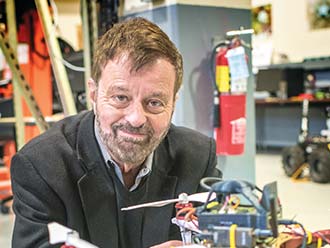As Ashford Sonii prepared to enter his junior year as a political science major at UTA, he started feeling anxious about his career prospects after graduation. “Nothing dramatic triggered the feeling, but I started thinking about what life would look like after I graduated,” he says.
Sonii wondered how he would answer interview questions or whether he would have the skills to market himself to a future employer. He decided to turn to the UTA Lockheed Martin Career Development Center for guidance. With its help, he landed two internships with the city of Arlington. As an intern, Sonii was able to see classroom theories in action and use critical thinking skills to respond to issues. He deepened his understanding of local government and public administration. After those internships, he graduated with a political science and leadership honors degree in 2017.
Sonii, now a grants and contracts coordinator with the North Central Texas Council of Governments, says his biggest regret is that he didn’t visit the center sooner.
“UTA’s programs and professors gave me the tools to succeed, but the Career Development Center showed me how to use them.”
Each semester, thousands of UTA students earn their diplomas and prepare to enter the workforce. Through student and career success initiatives, UTA is ensuring that these students are prepared to be the next generation of innovators, leaders, builders, and more.
MAVERICK ADVANTAGE
UTA is committed to preparing students for their future careers through experiential learning opportunities inside and outside the classroom. The Maverick Advantage program encourages students to participate in experiential learning within five distinguishing activities:
• Leadership Development
• Undergraduate Research
• Community Engagement
• Career Development
• Global Engagement
These activities enhance key skills employers are looking for, such as communication, critical thinking, and teamwork. Throughout their time at UTA, all students are expected to participate in three of the five distinguishing activities before graduation. Students who complete three of the five can apply for Maverick Advantage Distinction.
According to Forbes, Texas ranks first for economic climate, and at $1.6 trillion, it claims the second-biggest economy in the United States. It is home to the second-largest civilian workforce in America. Over 40 Fortune 500 companies have offices in the Dallas-Fort Worth Metroplex. Research from the Economic Policy Institute shows that high-wage states are states with a well-educated workforce.
The demand for strong talent in Texas is real. In the next 12 years, at least 60 percent of Texans are expected to need a certificate or degree for the state to stay competitive in the global economy. To meet the growing need, the Texas Higher Education Coordinating Board’s 60x30TX goal is challenging higher education institutions to not only graduate more students, but also to better prepare them to enter the workforce.
By providing increased access, strengthening support services, and graduating more students than ever, UTA is rising to that challenge.
No longer is it enough to just have a diploma. As Sonii found through his internships, graduates must also have a solid foundation of soft skills: professionalism, teamwork, and critical thinking just to start. UTA’s comprehensive academic and student success programs are providing students just that, enabling them to arrive to the workplace on day one ready to thrive.
START STRONG, FINISH STRONG
Before students can prepare to succeed in the workplace, they must first learn to succeed in the classroom. UTA offers myriad programs designed to help prepare students to excel in their academic endeavors. From day one, UTA students are enrolled in firstyear experience courses. These classes provide students with a dedicated faculty member to guide them during their first year at UTA, whether as a freshman or transfer student.
The instructors, paired with a student peer instructor, are from the student’s home department— meaning bioengineering students have a direct connection to a bioengineering faculty member outside of the standard classroom or lab setting. These instructors offer not only academic advice, but also practical insight from their own career experiences. Students benefit from learning from real-life examples of their faculty’s triumphs and mistakes.
Ashley Purgason, associate vice provost in the Division of Student Success, says this is just one of UTA’s efforts to provide holistic support for its students.
“From improving the registration process at orientation to pursuing increased access to advising, student success is a focus on our campus like never before,” says Dr. Purgason. By developing a closer partnership between the academic units and the division, UTA is able to support each student’s journey from Maverick orientation to graduation day and beyond.
Another student success program, the Bachelor of Science in University Studies, aims to help students near degree completion finish their studies. Utilizing an innovative degree plan that saves students both time and money, the University Studies degree offers an interdisciplinary foundation custommade for the student’s individual career goals. The degree is a great fit for working students, adult learners, and others looking to earn a great degree quickly.
Students who have already begun their careers are able to take courses that will directly benefit them professionally. Additionally, new students can design a unique course load to perfectly fit their future career goals. “The degree allows students to choose from a large menu of coursework that aligns with concentration areas,” says Purgason. “The program gives students the choice to study many different subjects rather than focusing on one area, as is the case with many traditional degree programs.”
Program staff also offers “just in time” advising to students who need last-minute assistance registering for classes and are unable to see their regular advisor. These staff members provide one-on-one academic coaching to develop students’ time management and study skills—critical soft skills that will enhance their professional worth in the job market.
The workplaces of tomorrow will require employees to be experts at so much more than just one skill or concentration. Programs like the University Studies degree give UTA students a robust and diverse academic experience, all while ensuring they have a leg-up on the job competition.
These programs are cultivating a culture of excellence at UTA that’s directly leading to results for our graduates. Based on fall 2018 estimates, degrees awarded have increased 7.7 percent, and four-year graduation rates have increased 1.4 percent since fall 2017. Year after year, UTA continues to increase the number of highly skilled employees entering the workforce to build a better Texas.
COVERING ALL THE BASES
A shining glass façade greets the next generation of Texas’ workforce, ushering students into UTA’s Lockheed Martin Career Development Center. During the 2017-18 academic year, the center served more than 22,700 students and held nearly 650 events and experiences for students and alumni. More alumni than ever are getting involved; the center has developed over 200 new alumni partnerships in the past year.
The center brings together around 150 companies and more than a thousand students for the semi-annual job fair, its keystone event each semester.
In the days leading up to the fair, students and alumni can take advantage of résumé writing seminars, career discovery workshops, mock interviews, and networking events. Each of these training events features employers who can provide helpful onsite advice and networking opportunities. Clients can also schedule a time to get their own headshot, perfect for updating their LinkedIn profiles. Providing a one-stop job market is just one of the ways the center is working to provide students and alumni with all the tools they need to succeed in the career of their dreams.
Throughout the rest of the year, students and alumni can connect with potential employers through Handshake, UTA’s online job database. Greg Shirley, assistant director for career services and operations, says the database has already seen the creation of more than 13,000 student and alumni profiles in the year and a half since implementation.
Lolin Martins-Crane (’88 BS, Psychology), director of the center, says a major piece of their work is helping Mavericks tell their stories. Her team works to understand and highlight each client’s unique professional and academic experience. With the help of expert résumé and career consultants, UTA students and alumni can take their résumés to the next level, all while showcasing their unique talents and abilities.
Internships are now critical to every student’s collegiate experience. They provide students with genuine work experience, which lets employers know students have tested their skills in the workplace. As a student, Alexis Garcia (’17 BBA, Management) worked two internships—one as a community programs intern with the North Texas Community Foundation and another as an event intern with the Dallas Regional Chamber.
“I got to be around professionals from all different industries and different backgrounds,” she says. “It gave me a taste of what it is like to work on teams and to problem-solve through a variety of issues that came my way.”
Her internships provided her a path to discover her true passion for serving the community around her. The Dallas Regional Chamber was so impressed with her work that they offered her a position as member engagement coordinator, and she accepted. Now a year into the job, she couldn’t be happier with the incredible start to her career.
UTA is also providing career service programs for veterans and military service members to prepare them for transition into the civilian workforce. James Kumm, the executive director of veteran programs at UTA, has partnered with the center to provide unparalleled support that puts veterans’ needs first.
A major initiative between the two programs has been the UTA Veteran Lunch and Learn events. Veterans employed at major DFW companies visit with students over lunch to provide perspective on post-military careers. Kumm says this is an opportunity for student veterans to network with professionals and learn about different industries.
PROFESSIONAL PARTNERSHIPS
As students prepare to enter the workforce, mentors can provide invaluable guidance and insight. The center facilitates alumni mentor/student mentee relationships and helps students cut through the sometimes-awkward task of approaching a mentor. Pairs can meet at the center and use the many conference and job interview rooms to practice life skills or discuss goals and plans. Ultimately, it’s an opportunity for students to discover who they want to be professionally, what they are passionate about, and what they want to spend their career working toward.
Natalie Thomas (’16 BA, ’18 MA, Political Science) and Bob Babbitt (’76 BA, Political Science; ’84 PhD, Administration), recently retired president of McDonald Transit, are an example of UTA’s successful mentor and mentee partnerships. Thomas is a former Archer Fellow, a competitive UT System program that brings highly motivated students to Washington, D.C. for an unparalleled academic and professional experience. Both she and Dr. Babbitt studied political science and were able to develop an easy rapport.
Students aren’t the only ones to benefit from these partnerships. “It is important for mentors to remain active in shaping the future professionals,” Babbitt says. “Alumni mentors can better learn about the workforce of tomorrow by interacting with student mentees. What better way to understand the needs, motivations, and inspirations of younger professionals than by working directly with them?”
Beyond serving as mentors, alumni can use any of the free services offered at the Lockheed Martin Career Development Center. From attending the job fair or scheduling a career consultation, there are a number of services that can help alumni advance their careers.
“It’s a culture of holistic support that ensures our Mavericks succeed in the workforce, no matter what stage of their careers they are in,” Martins-Crane says. “If our students and alumni have the support of not only the University, but also the entire Maverick nation, they can achieve any career goal.”


